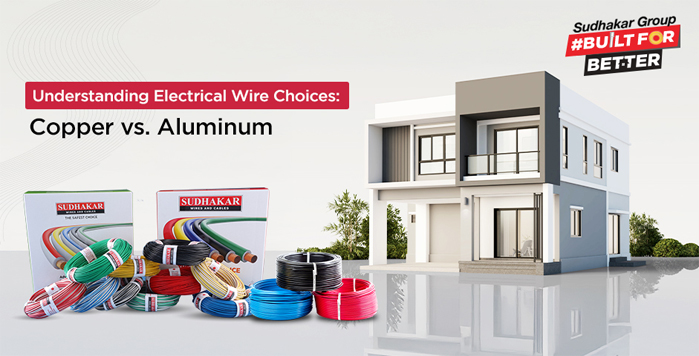Electrical wiring uses two common materials, copper and aluminum. Historically, copper has been the material of choice for decades, but aluminum is gaining popularity due to its lower price point. Let’s compare the two using the following criteria: conductivity, durability, price, and safety.
1. Conductivity: Which Wire Transfers Electricity Better?
Electrical conductivity is the measure of the ability of an electric wire to carry current. The higher the conductivity, the lower the energy lost as heat.
Winner of Conductivity: Copper Wire
- Copper has a high electrical conduction ability, thus making it the obvious choice for wiring homes, industries, and even power grids.
- With less resistance, there is better power transmission efficiency and fewer chances of overheating.
Aluminum Wire: For Those on a Budget
- At about 60 percent of the conductivity of copper, an aluminum wire must be much thicker to carry an electrical load equal to that of a copper wire.
- Aluminum wires offer significant advantages, particularly in applications where weight reduction is essential. They are widely used in overhead power lines and large industrial settings due to their lightweight nature, cost-effectiveness, and excellent conductivity.
2. Durability: Which Wire Lasts Longer?
Durability is another serious consideration when you want your wiring system to be maintained as little as possible over the years.
Copper Wire: Tough and Durable
- Copper is more durable and able to withstand extreme weather conditions and thus should be considered for long-term installation.
- Copper expands and contracts less than aluminum under heat, resulting in minimized chances of loose connections.
- Copper wire is better against corrosion and can very well withstand wet or damp locations.
Aluminum Wire: Lightweight but Prone to Expansion
- Aluminum is much softer than copper; it easily breaks with the slightest fault, and this leads to connection failures after some time.
- It expands and contracts more than copper, and when installed improperly, this can create problems with wiring.
- It oxidizes faster, thus the aluminum connections need a special coating or anti-oxidation compound to save from damage.
3. Safety: Which Wire Poses Fewer Electrical Threats?
Safety is an important factor in the selection of an electrical wire. A wrong choice could ignite a fire hazard and demand expensive repairs.
Copper Wire: The Safer Option for Houses
- Copper wires have lesser chances of overheating and have stronger connections.
- They do not loosen easily over time, which means fewer chances of arcing and eventually an electrical fire.
- Copper is also mated with all standard electrical fittings much more readily.
Aluminum Wire: Additional Precautions Needed
- Aluminum wires need to be very carefully installed because aluminum will bloat and contract, it creates an additional challenge when looking at connection points that will lead to greater chances of an electrical fire.
- Specialized Connectors, along with anti-oxidation compounds, must be used for safety in this regard.
- Many older homes with aluminum wiring now need upgrades to meet today’s safety standards.
Wrap up: Choosing the Right Wire for Your Needs
Choosing the right electrical wire is important, whether you are a consumer, builder, or in the wire and cable manufacturing business. Copper wires have much better conductivity, durability, and safety; thus, they are the wire of choice in homes and industries where reliability is paramount. Aluminum wires, on the other hand, are an inexpensive alternative for large-scale projects but require a lot of tender care and maintenance.
When wire shopping, always go for reputable electrical wire manufacturers to ensure quality and safety. A good electrical wire makes a huge difference in the way an entire wiring system performs and lasts.
Are there any more questions about how to go about choosing the right wires? Leave your thoughts down below, or contact your local supplier today!


